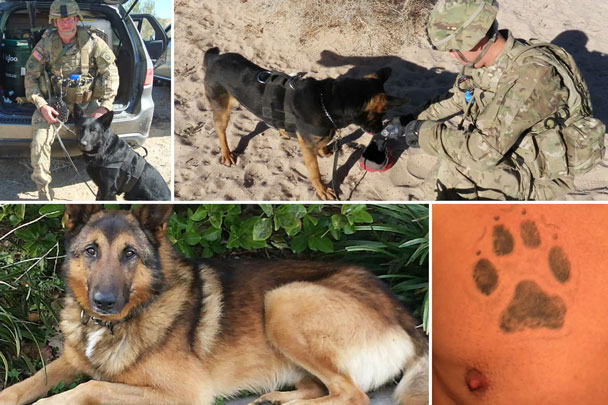Listen to “Military Working Dogs Form Bonds with Handlers -Pet Wellness Month” on Spreaker.

October is National Pet Wellness Month
HOW MILITARY DOGS WORKING FOR CRITICAL MISSIONS
STAY HEALTHY AND READY TO ASSIST SOLDIERS
Military Working Dogs serve alongside Soldiers in crucial roles, including detecting explosives and narcotics and providing protection, significantly enhancing operational success and safety.
The Army Reserve invests extensive time and resources into training Military Working Dogs, ensuring they are skilled in areas such as tracking, detection, patrol, and search-and-rescue missions, making them invaluable assets on the battlefield. Today, the Army Reserve has just over 500 Military Working Dogs and mine-detection dogs.
Beyond their operational value, Military Working Dogs build strong bonds with their handlers, fostering trust and morale. They are more than tools—they are trusted teammates and companions. The Army Reserve recognizes and values the loyalty and dedication of Military Working Dogs by ensuring they receive top-quality care during their service and a dignified retirement once their duties are complete, often being adopted by their handlers or loving families.
The U.S. Army Veterinary Corps and the Army Military Working Dogs Program takes a holistic approach to the dogs’ overall wellness and quality of life. In addition to the Military Working Dogs, Army Reserve veterinarians often serve as the first line of care for service members’ pets, ceremonial horses, and other animals within the Department of Defense.
The Veterinary Corps is a unique branch of the Army organized under the Army Medical Department. Army Reserve veterinarians are critical to the military, often performing important roles such as:
Provide routine medical care, perform surgeries, and respond to emergency situations.
Lead cutting-edge research to advance the understanding of zoonotic diseases (those that can spread from animals to human), biosecurity, and animal health.
Ensure the safety and quality of food consumed by Soldiers by inspecting food production and distribution facilities, like our posts’ commissaries. The Soldiers ensure that food supplies are free from contamination and meet safety standards both in the U.S. and deployed locations.
Lieutenant Colonel (LTC) Jessica Brozda, a Veterinary Preventive Medicine Officer based at Picatinny Arsenal, New Jersey, and the Officer in Charge (OIC) of the 7358th Veterinary Detachment. She’ll discuss the role of a veterinarian in the military and explain how they play a vital role in improving Military Working Dogs’ quality of life and overall wellness, as well as caring for other animals.
#military #working #dogs #handlers #pet #mission #soldiers #detectingexplosives #narcotics #protection #enhancingoperational #safety


 Thought for the Day…10/28/24
Thought for the Day…10/28/24